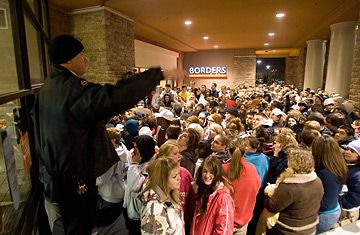
A mall security guard tries to control the crowd before the opening of the Boise Town Square Mall in on Black Friday, November 23, 200 in Boise, Idaho.
Hordes of frenzied shoppers had barely descended upon shopping malls and retail stores at the crack of dawn on the day now dubbed Black Friday when the breathless speculation about how weak or strong this year's holiday shopping season began. The dirty little secret, however, is that the day is actually not a very good predictor of holiday sales overall. "No matter how successful Black Friday is, it's the weeks before and after Christmas that will determine how successful of a holiday season it is," says Scott Krugman, of the National Retail Federation (NRF).
In any case, it's still too early too tell how even Black Friday weekend will shake out. Retailers don't report their November sales until early December, and the estimates by research firms range from a glum 6% decrease in purchases by NPD Group to a cheery 7.2% increase as tallied by ShopperTrak in Chicago, Illinois. For its part, the National Retail Federation (NRF) estimated that mall shoppers spent $347.44 or 3.5% less this past weekend than they did over the same period last year.
One undisputed bright spot has been online sales. Some 72 million people planned to shop online on "Cyber Monday," as the Monday after Thanksgiving has been recently christened, according to NRF. Traffic to online shopping sites had already increased 10% on Black Friday weekend compared to last year, according to Nielsen Online. Belt-tightening may have much to do with the increase, as shoppers spend more time researching the low prices than in past years. The comparison shopping site Yahoo! Shopping reported a 50% increase in page views over the weekend compared with last year. The top items shoppers clicked on included a Kenneth Cole reaction black wool Trench Coat starting at $66.99 and the $79.99 Transformers Ultimate Bumblebee action figure, which is already sold out on all but auction sites.
Whatever the numbers say now, it's hard to believe that many shoppers' maxed-out credit cards and a murky economic outlook won't cause many Americans to have a leaner Christmas this year. Gwen DiBello, 40, still made her annual trek to Saks Fifth Avenue at the upscale Dallas Galleria on the day after Thanksgiving, but the soccer mom, 40, admitted, "I'm spending less this season because money is a little tighter than in years past." Meanwhile at the Aventura Mall in suburban Miami, Raquel Babani, a 28-year-old teacher from Hallandale, said, "It's the same shopping, but I'm getting good sales."
After a soft October and November, in which unseasonably warm weather put a damper on shopping, big retailers pulled out all the stops for Black Friday with their 5 a.m."door busters" on everything from laptop computers to the new High School Musical board game. Apparel sold surprisingly well, thanks in part to pent-up demand, now that colder weather has finally set in. And despite the massive toy recalls, just as many shoppers reported buying toys this year as last, according to the NRF.
ShopperTrak's Bill Martin expects a lull over the next few weeks as "a lot of procrastinating kicks in." After all, with an unusually long 32 shopping days between Thanksgiving and "super Saturday" (that's right, the Saturday before Christmas), what's the rush?
with reporting by Matt Kettmann/San Jose and Siobhan Morrissey/Aventura
